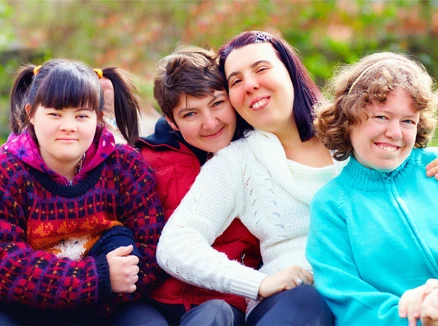Barriers
Understand some of the barriers to screening this community faces.
People with disability face barriers to screening in addition to those faced by the general population due to a range of factors including individual, interpersonal, organisational and environmental.
The barriers listed below are those Cancer Council Victoria has heard of through our partnerships with disability organisations.
Ableism
Ableism is defined in the Inclusive Victoria: state disability plan 2022–2026 as "discrimination or prejudice towards people with disability. It can be described as the systemic and interpersonal exclusion and oppression of people with disability”.
Unfortunately, people with disability still face ableism is health care settings. This discrimination or prejudice can take many forms, including assumptions that people with disability are not sexually active, not considering the specific needs of people with disability in accessing doctor’s clinics, or healthcare workers speaking to a person with disability’s family member rather than to them directly.
Communication
Communication barriers are present throughout the entire screening process, including cancer screening pathways.
- Making doctors' appointments can be difficult for some people with disability. Having the option to book an appointment online or via email, or via phone call with TTY (Speak and Read) can reduce this barrier.
- Most health information is written in standard English. Having resources available in a range of formats (for example, Easy English, plain English, videos, large print, audio and more) increases access to information. This barrier is further compounded for people with disability for whom English is not a first language.
Financial
The costs associated with cancer screening restrict participation for some people with disability. Although many cancer screening services themselves are free, costs associated with cancer screening access, including booking taxis or booking support people, can be prohibitive.
Access
Access is a broad term encompassing several barriers that are prevalent across the three screening programs and throughout the entire screening pathway.
Accessibility of clinics or GP services
This includes infrastructure barriers such as wheelchair accessible ramps, wide doorways, hoists, lowered reception desks and accessible toilets and parking. Having information available ahead of time, or lists of physically accessible clinics (such as the Cancer Council Cervical Screening Directory) can allow informed choice and better access when choosing a provider.
Physical
- An adjustable bed or hoist may be required for women and people with a cervix with physical disability having a clinician-collected Cervical Screening Test. Installing adjustable beds/hoists is expensive and, as a result, not all health services or GP rooms are equipped with one or have one readily available at time of appointment. Lack of this equipment may result in an individual needing to travel further to another clinic, often at additional cost.
- For bowel cancer screening, it can be challenging for people with visual or physical disability to collect the faecal sample, as it requires a high level of coordination. Furthermore, standard instructions and information that comes with the bowel screening test is not accessible to many people, including who are blind or who have low vision. Given the sensitive nature of the test, people may feel embarrassed about asking a family member, friend or support worker to assist with the process.
- Women with physical disability may also face some obstacles in accessing a mammogram. The design of the mammogram machine means that women need to be able to either stand unassisted, or lean forward in their wheelchair, while lifting their arm above the shoulder. For some women with physical disability this may not be possible. Women with disability are asked to call BreastScreen Victoria on 13 11 20 to find a clinic that will meet their needs – some BreastScreeen Victoria clinics are wheelchair accessible.
Competing health needs
People with disability often have multiple disabilities and chronic health conditions, resulting in many medical appointments. As a result, preventative health (including cancer screening) may not be high priorities for the patient or GP.
Fear
Fear and anxiety about cancer screening are common barriers experienced by the general population; however, for people with disability these feelings may be more profound. Previous negative experiences with hospitals and health professionals which may have been traumatic, may impact heavily on people's decisions to participate in cancer screening or return for a re-screen or diagnostic assessment.
Stigma
A significant barrier for women with disability (particularly intellectual disability) participating in cervical screening is facing family and health care workers' assumptions that they are not sexually active. This results in a lack of discussion about cervical screening: some people report being told incorrectly that they don't need a Cervical Screening Test by health professionals. Also, an assumption from some health professionals that still exists is that people with disability “do not get cancer” and that any pain, illness or changes are due to the disability rather than anything else.
Health professionals, families and support workers
Health professionals, families and support workers are often the gatekeeper to medical appointments and procedures for people with disability. If family or support workers are not aware of cancer screening, they may lack the knowledge or skills to promote it to the person they support. There may also be a reluctance to encourage cancer screening due to concerns about what to do next if cancer was to be detected.
The Australian Centre for Developmental Disability Health can provide support to health services to address the health needs of adults with intellectual disability.
Intersectional barriers
It is vital to consider compounding barriers that will affect people with disabilities participating in cancer screening. People with disability who are, for example, also culturally and linguistically diverse, Aboriginal or Torres Strait Islander or LGBTIQ+ may experience extra barriers that affect those communities, in addition to the barriers affecting people with disability.
